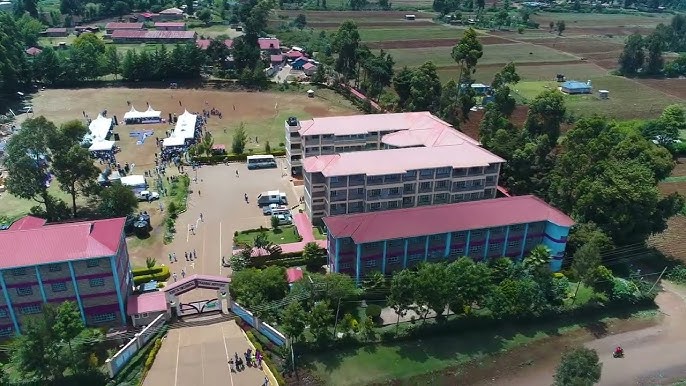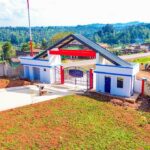Kiirua Technical Training Institute (KTTI), located in Naari Location, Buuri Sub-County, Meru County, is a public Technical and Vocational Education and Training (TVET) institution dedicated to providing practical skills for employment and entrepreneurship. Established in 1990 under a Youth Support Training Programme (YSTP) with funding from the European Economic Commission (EEC), Voluntary Services Overseas (VSO), and the Government of Kenya, KTTI is registered under the Technical and Vocational Education and Training Authority (TVETA) with license number TVETA/PUBLIC/TVC/0031/2016. Offering competency-based education and training (CBET) programmes accredited by the TVET Curriculum Development Assessment and Certification Council (TVET-CDACC) and examined by the Kenya National Examinations Council (KNEC), KTTI provides training in engineering, business, ICT, fashion, and social work. Situated 13 km from Meru Town and 2 km from Kiirua Market off the Meru-Nanyuki Highway, KTTI serves Meru County’s agricultural and commercial hub. This article details the full list of courses offered at KTTI for the 2025/2026 academic cycle, admission requirements, programme durations, and career prospects, optimized for readers seeking comprehensive information on technical education.
Why Choose Kiirua Technical Training Institute?
KTTI is strategically positioned to serve Meru County, a region known for its agricultural productivity in miraa, tea, and coffee, and a growing demand for skilled professionals in engineering, business, and technology. Here’s why KTTI is an excellent choice:
- Competency-Based Curriculum: Programmes align with industry needs, ensuring graduates are job-ready, as mandated by TVET-CDACC.
- Practical Training: Modern workshops and labs facilitate hands-on learning in automotive engineering, electrical installation, and fashion design.
- Accessible Location: Located 13 km from Meru Town, KTTI is easily accessible via the Meru-Nanyuki Highway, serving students from Meru and neighboring counties.
- Flexible Entry Requirements: Artisan, certificate, craft, and diploma programmes cater to diverse academic backgrounds, from KCPE to KCSE C-.
- Funding Support: Students can access Higher Education Loans Board (HELB) loans and Meru County bursaries to cover fees and upkeep.
- Multiple Intakes: Admissions occur in January, May, and September, offering flexibility for applicants.
This guide explores KTTI’s 28 programmes for the 2025/2026 cycle, helping you navigate your path to a rewarding career.
Full List of Courses Offered at Kiirua Technical Training Institute (2025/2026)
Below is the complete list of programmes offered at KTTI for the 2025/2026 academic year, as per the Kenya Universities and Colleges Central Placement Service (KUCCPS) data. The institute offers diploma, craft, certificate, and artisan programmes in engineering, business, ICT, fashion, and social work.
Diploma Programmes
- Diploma in Community Development and Social Work (Code: 1048552)
- Duration: 2.5 years
- Minimum Entry Requirements: KCSE Mean Grade C- (minus) or equivalent.
- Overview: Covers community mobilization, social work practices, and development projects, with fieldwork tailored to Meru’s community needs.
- Career Prospects: Social workers, community development officers, or NGO programme managers.
- Diploma in Clothing Technology (Code: 1048557)
- Duration: 2.5 years
- Minimum Entry Requirements: KCSE Mean Grade C- (minus) or equivalent.
- Overview: Advanced garment design, textile production, and fashion entrepreneurship, with practical studio work.
- Career Prospects: Fashion designers, textile industry managers, or boutique owners in Meru’s fashion sector.
- Diploma in Electrical and Electronics (Code: 1048607)
- Duration: 2.5 years
- Minimum Entry Requirements: KCSE Mean Grade C- (minus) or equivalent; credits in Mathematics and Physics are preferred.
- Overview: Focuses on electrical systems, electronics, and maintenance, with hands-on training in modern labs.
- Career Prospects: Electrical engineers, electronics technicians, or renewable energy specialists.
- Diploma in Automotive Engineering (Code: 1048701)
- Duration: 2.5 years
- Minimum Entry Requirements: KCSE Mean Grade C- (minus) or equivalent; credits in Mathematics and Physics are preferred.
- Overview: Covers vehicle mechanics, diagnostics, and repair, with practical training in automotive workshops.
- Career Prospects: Automotive engineers, mechanics, or garage owners.
- Diploma in Civil Engineering (Code: 1048705)
- Duration: 2.5 years
- Minimum Entry Requirements: KCSE Mean Grade C- (minus) or equivalent; credits in Mathematics and Physics are preferred.
- Overview: Teaches structural design, road construction, and civil engineering principles, with practical training.
- Career Prospects: Civil engineering technicians, site supervisors, or infrastructure planners.
- Diploma in Supply Chain Management (Code: 1048746)
- Duration: 2.5 years
- Minimum Entry Requirements: KCSE Mean Grade C- (minus) or equivalent.
- Overview: Covers procurement, logistics, and supply chain operations, aligning with Meru’s trade activities.
- Career Prospects: Supply chain managers, logistics officers, or procurement specialists.
- Diploma in Business Management (Code: 1048751)
- Duration: 2.5 years
- Minimum Entry Requirements: KCSE Mean Grade C- (minus) or equivalent.
- Overview: Teaches business operations, marketing, and management principles, with practical case studies.
- Career Prospects: Business managers, entrepreneurs, or corporate administrators in Meru’s commercial sector.
- Diploma in Business Administration/Management (Code: 1048753)
- Duration: 2.5 years
- Minimum Entry Requirements: KCSE Mean Grade C- (minus) or equivalent.
- Overview: Focuses on administrative processes, organizational management, and strategic planning.
- Career Prospects: Administrative officers, business consultants, or office managers.
- Diploma in Information Communication Technology (Code: 1048758)
- Duration: 2.5 years
- Minimum Entry Requirements: KCSE Mean Grade C- (minus) or equivalent.
- Overview: Covers network management, programming, and IT support, supporting Kenya’s digital economy.
- Career Prospects: IT technicians, network administrators, or software support specialists.
- Diploma in Community Development (Code: 1048771)
- Duration: 2.5 years
- Minimum Entry Requirements: KCSE Mean Grade C- (minus) or equivalent.
- Overview: Focuses on community development projects, advocacy, and social empowerment, with fieldwork components.
- Career Prospects: Community development officers, NGO coordinators, or social advocates.
- Diploma in Human Resource (Code: 1048789)
- Duration: 2.5 years
- Minimum Entry Requirements: KCSE Mean Grade C- (minus) or equivalent.
- Overview: Teaches HR practices, recruitment, and employee management, with practical applications.
- Career Prospects: HR officers, payroll managers, or consultants in public and private sectors.
- Diploma in Building Technology (Code: 1048876)
- Duration: 2.5 years
- Minimum Entry Requirements: KCSE Mean Grade C- (minus) or equivalent.
- Overview: Covers construction techniques, building design, and project management, with hands-on training.
- Career Prospects: Construction managers, site engineers, or building inspectors in Meru’s infrastructure sector.
Craft Programmes
- Craft in Automotive Engineering (Code: 1048769)
- Duration: 2 years
- Minimum Entry Requirements: KCSE Mean Grade D (plain) or equivalent.
- Overview: Basic vehicle mechanics, diagnostics, and repair skills, with practical training in workshops.
- Career Prospects: Automotive technicians, mechanics, or apprentices.
- Craft in Building Technology (Code: 1048774)
- Duration: 2 years
- Minimum Entry Requirements: KCSE Mean Grade D (plain) or equivalent.
- Overview: Basic construction techniques and building materials, with hands-on training.
- Career Prospects: Construction assistants or progression to diploma studies.
- Craft in Information Communication Technology (Code: 1048798)
- Duration: 2 years
- Minimum Entry Requirements: KCSE Mean Grade D (plain) or equivalent.
- Overview: Basic ICT skills, including computer applications and IT support, with practical training.
- Career Prospects: IT support assistants, data entry clerks, or progression to diploma studies.
- Craft in Human Resource Management (Code: 1048888)
- Duration: 2 years
- Minimum Entry Requirements: KCSE Mean Grade D (plain) or equivalent.
- Overview: Basic HR practices and employee relations, with practical applications.
- Career Prospects: HR assistants, administrative roles, or progression to diploma studies.
- Craft in Plumbing (Code: 1048935)
- Duration: 2 years
- Minimum Entry Requirements: KCSE Mean Grade D (plain) or equivalent.
- Overview: Basic plumbing system installation and maintenance, with practical training.
- Career Prospects: Plumbers, pipe fitters, or plumbing assistants.
- Craft in Social Work and Community Development (Code: 1048956)
- Duration: 2 years
- Minimum Entry Requirements: KCSE Mean Grade D (plain) or equivalent.
- Overview: Basic community mobilization and social work principles, with fieldwork components.
- Career Prospects: Community support workers or progression to diploma studies.
- Craft in Supply Chain Management (Code: 1048957)
- Duration: 2 years
- Minimum Entry Requirements: KCSE Mean Grade D (plain) or equivalent.
- Overview: Basic procurement and logistics management skills, with practical training.
- Career Prospects: Supply chain assistants, logistics coordinators, or progression to diploma studies.
Certificate Programmes
- Certificate in Electrical and Electronic Engineering (Code: 1048820)
- Duration: 2 years
- Minimum Entry Requirements: KCSE Mean Grade D (plain) or equivalent.
- Overview: Basic electrical and electronic systems maintenance, with hands-on training.
- Career Prospects: Electrical technicians, power assistants, or apprentices.
- Certificate in Fashion Design and Garment Making (Code: 1048848)
- Duration: 2 years
- Minimum Entry Requirements: KCSE Mean Grade D (plain) or equivalent.
- Overview: Basic garment design and sewing techniques, with practical studio work.
- Career Prospects: Tailors, garment makers, or progression to diploma studies.
- Certificate in Purchasing and Supply Management (Code: 1048941)
- Duration: 2 years
- Minimum Entry Requirements: KCSE Mean Grade D (plain) or equivalent.
- Overview: Basic purchasing and supply chain operations, with practical training.
- Career Prospects: Purchasing assistants, storekeepers, or progression to diploma studies.
Artisan Programmes
- Artisan in Fashion & Design (Code: 1048A03)
- Duration: 1 year
- Minimum Entry Requirements: KCPE certificate or equivalent.
- Overview: Basic fashion design and sewing skills, with practical training in studios.
- Career Prospects: Fashion design assistants, tailors, or self-employed seamstresses.
- Artisan in Electrical Installation (Code: 1048A21)
- Duration: 1 year
- Minimum Entry Requirements: KCPE certificate or equivalent.
- Overview: Basic electrical installation and maintenance skills for domestic and commercial use, with practical training.
- Career Prospects: Electrical installation assistants or apprentices.
- Artisan in Garment Making (Code: 1048A22)
- Duration: 1 year
- Minimum Entry Requirements: KCPE certificate or equivalent.
- Overview: Basic garment making and sewing techniques, with practical training.
- Career Prospects: Garment makers or progression to higher fashion programmes.
- Artisan in Plumbing (Code: 1048A67)
- Duration: 1 year
- Minimum Entry Requirements: KCPE certificate or equivalent.
- Overview: Basic plumbing system installation and maintenance, with hands-on training.
- Career Prospects: Plumbers, pipe fitters, or plumbing assistants.
- Artisan in Automotive Engineering (Code: 1048A81)
- Duration: 1 year
- Minimum Entry Requirements: KCPE certificate or equivalent.
- Overview: Basic vehicle mechanics and repair skills, with practical training in workshops.
- Career Prospects: Automotive assistants or apprentices.
- Artisan in Motor Vehicle Technology (Code: 1048B07)
- Duration: 1 year
- Minimum Entry Requirements: KCPE certificate or equivalent.
- Overview: Basic motor vehicle technology and maintenance skills, with practical training.
- Career Prospects: Motor vehicle technicians or apprentices.
Additional Programmes
KTTI may offer short courses to enhance specific skills, though not listed in the KUCCPS 2025/2026 cycle:
- Examples:
- Vocational Course in Dressmaking and Tailoring
- Computer Applications
- Basic Entrepreneurship Skills
- Duration: A few weeks to months
- Entry Requirements: Vary by course; typically KCSE certificate or relevant experience.
- Career Prospects: Skill enhancement for professionals or entry into specialized roles.
Admission Requirements and Application Process
General Admission Requirements
- Diploma Programmes: KCSE Mean Grade C- (minus) or equivalent.
- Craft and Certificate Programmes: KCSE Mean Grade D (plain) or equivalent.
- Artisan Programmes: KCPE certificate or equivalent.
- Short Courses: Vary by programme; typically require a KCSE certificate or relevant experience.
- Additional Requirements: Credits in Mathematics, Physics, or relevant subjects are advantageous for technical courses.
Application Process
- Obtain Application Form: Download from the KTTI website (www.kiiruatti.ac.ke) or collect from the admissions office at Naari, Buuri Sub-County, Meru.
- Pay Application Fee: Deposit the application fee (approximately KShs 1,000, non-refundable) to the designated KTTI bank account or M-Pesa Paybill (details available from the admissions office).
- Submit Application: Include photocopies of academic certificates, national ID, and the application fee receipt. Submit to Kiirua Technical Training Institute, P.O. Box 1931–60200, Meru, Kenya.
- Intake Periods: January, May, and September.
- KUCCPS Applications: Apply through the KUCCPS portal (students.kuccps.net) using your KCSE and KCPE index numbers.
Funding Opportunities
- HELB Loans and Bursaries: Available for TVET students to cover fees and upkeep. Apply via the HELB portal (www.helb.co.ke) by filling out the TVET Loan & Bursary Application Form (TLAF).
- Meru County Bursaries: The county government provides financial support for TVET students, with funds allocated annually.
- Scholarships: Limited scholarships may be available through KTTI or partner organizations. Contact the admissions office at info@kiiruatti.ac.ke or 0718 621864 for details.
Fee Structure and Accommodation
Fee Structure
- Diploma Programmes: Approximately KShs 60,000–80,000 per year.
- Craft and Certificate Programmes: Approximately KShs 40,000–60,000 per year.
- Artisan Programmes: Approximately KShs 20,000–30,000 per year.
- Short Courses: KShs 10,000–30,000, depending on duration. For the latest fee structure, contact KTTI’s admissions office at kiiruatti@yahoo.com or 0733668510.
Accommodation
- On-campus hostels are available, offering a conducive environment for learning.
- Cost: Approximately KShs 20,000–30,000 per semester (subject to availability).
- Hostel room booking details can be obtained from the admissions office.
KTTI’s Role in Technical Education and Industry Impact
KTTI is a key player in Meru County’s TVET landscape, a region with a population of over 1.5 million and a strong agricultural base in miraa, tea, and coffee. The institute supports Kenya’s Vision 2030 by providing skills in engineering, business, ICT, and social work, aligning with Meru’s economic activities, including agriculture, trade, and small-scale industries. Graduates contribute to:
- Engineering and Construction: Supporting infrastructure development in Meru, including roads, buildings, and power systems.
- Business and Supply Chain: Enhancing trade and logistics in Meru’s commercial hubs, such as Meru Town.
- ICT: Driving digital literacy and technology adoption in Eastern Kenya.
- Fashion and Social Work: Promoting entrepreneurship in textiles and addressing community needs through development projects.
Career opportunities include:
- Public Sector: County governments, ministries, and parastatals.
- Private Sector: Construction firms, automotive garages, IT companies, and fashion enterprises.
- Self-Employment: Entrepreneurship in fashion, automotive repair, or technical services.
- NGOs: Roles in community development and social work.
Why KTTI Stands Out in 2025/2026
KTTI’s focus on competency-based education, modern facilities, and alignment with TVET-CDACC standards ensures graduates meet industry expectations. Its location in Naari, near Meru’s agricultural and commercial hubs, positions students to tap into local economic opportunities. With flexible entry requirements, multiple intakes, and access to HELB and county bursaries, KTTI is accessible to students from diverse backgrounds.
Kiirua Technical Training Institute offers 28 programmes for the 2025/2026 academic cycle, ranging from artisan courses like Artisan in Plumbing to diplomas like Diploma in Civil Engineering. Its commitment to practical training and industry relevance makes it an ideal choice for students seeking skills in engineering, business, ICT, fashion, or social work. Whether you aim to become an automotive engineer, fashion designer, or community development officer, KTTI provides the foundation for a successful career.
For more information or to apply, contact KTTI’s admissions office at info@kiiruatti.ac.ke, 0718 621864.





